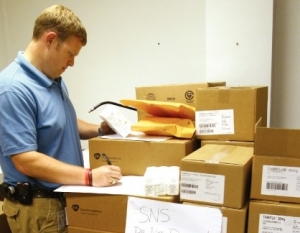H1N1 case confirmed at Seymour Johnson AFB
By Kenneth Fine and Phyllis Moore
Published in News on June 4, 2009 1:46 PM

News-Argus/BOBBY WILLIAMS
David Hesselmeyer, regional preparedness coordinator for health departments in the region, checks over flu vaccines at the Wayne County Health Department early Thursday.
Local health officials are reacting this morning -- and a 4th Fighter Wing airman is isolated at home -- after confirmation of Wayne County's first H1N1, or "swine flu," case.
The news reached Seymour Johnson Air Force Base early Wednesday afternoon via test results from the U.S. Air Force School of Aerospace Medicine Epidemiology Lab at Brooks City Base, Texas.
But neither the installation nor county is ready to "hit the panic button" just yet.
In fact, officials are confident that if local residents take the proper precautions, the influenza strain will remain confined to the patient currently infected.
County Health Director James Roosen said he is satisfied with the way the initial investigation into the case was handled.
"Contact tracing" is standard, he said -- asking the infected person questions like whether he or she went to work, school or church, or other public places where he or she might have come in contact with anyone.
"We have already done all that," Roosen said. "I don't have a lot of concerns from what I have heard."
And base officials have already begun educating airmen and other personnel.
"We are taking the necessary precautions to educate and safeguard military and civilian personnel, as well as family members," said Col. Stephen Higgins, 4th Medical Group commander. "This case was diagnosed early and, as a result, helps in preventing the spread of the disease."
Wayne's first case brings the state total of confirmed swine flu cases to 29. And the Centers for Disease Control and Prevention estimates more than 100,000 others have been infected in the country to date.
"I would suspect there's probably a lot of undiagnosed cases right now," Roosen said.
The Johnston County Public Health Department was notified by the State Laboratory of Public Health Wednesday that a case of H1N1 influenza has been confirmed in a Johnston County teenager who does not attend public or private school in Johnston County. The parents of the teenager have been notified.
The Johnston County Public Health Department is working to determine who might have been exposed before the patient showed symptoms.
The symptoms of H1N1 are similar to those of seasonal flu -- fever, coughing, sore throat, runny or stuffy nose, body aches, headache, chills and fatigue -- but many who have contracted the disease also have reported diarrhea and vomiting. Also, like seasonal flu, death has occurred as a result -- mostly in those with compromised immune systems.
But unlike seasonal flu, which typically poses a more severe threat to people 65 years and older and children younger than 5 years old, the largest number of H1N1 flu confirmed and probable cases have occurred in people between the ages of 5 and 24.
Local nursing homes aren't taking any chances.
"We have actually had precautions in place now for six weeks," said Bill Marshall, administrator of Sunbridge Care and Rehab of Mount Olive.
Staff members are briefed each time new information comes in from the CDC, respirator masks are available in the event of an outbreak and visitors have been asked to stay away if they are symptomatic.
"If you have symptoms, you should not be here," Marshall said. "Being a nursing facility, this is folks' homes and they are entitled to receive visitors. We'll continue to abide by their wishes and follow the guidelines. All you can do is hope that the consuming public exercises some good care if they are going about visiting public places."
The county has been preparing, too.
The Health Department has received doses of Tamiflu and antiviral medications, which it began distributing to area physicians today.
And at Wayne Memorial Hospital, staff are ready to embrace an anticipated increase in emergency room visits and phone calls.
"It's not like there has been a spike in hospitalizations. We have not seen that, and that's a good thing," said Amy Cain, the hospital's director of public relations. "But I have no doubt that we will see an increase in phone calls and visits. And we're ready for that."
Still, Ms. Cain was quick to note that while traffic at the hospital is expected to increase dramatically, the number of H1N1 cases is not.
"Will we see a huge spike in cases? Probably not," she said. "The base is totally on top of this. If anyone can control this or contain things, it's them. So I think it's really important for people not to panic."
Roosen agrees.
"People just need to recognize the symptoms, be careful about their habits of washing their hands, don't touch their noses or eyes. It operates the same way as all flu," he said. "That is, it's real important not to go to work while you're sick, keep an eye on your kids. What we're trying to do is just contain it."
